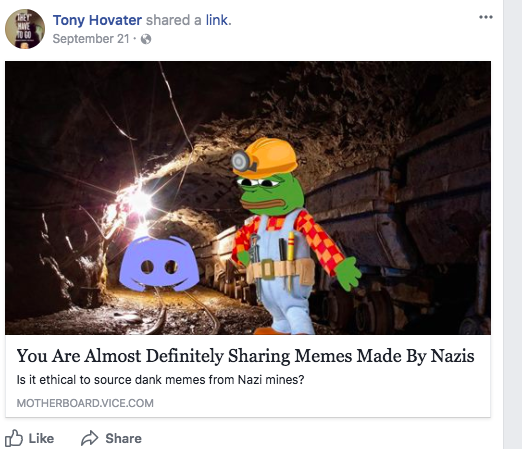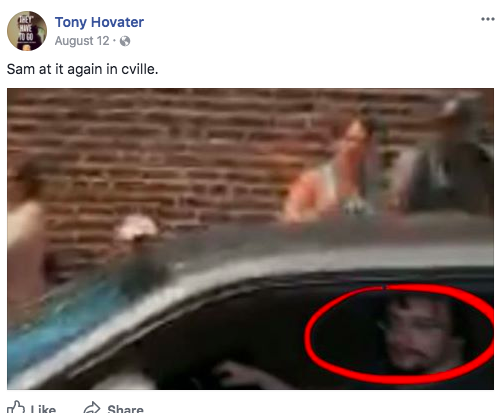
In a follow-up to his New York Times feature on Tony Hovater, the 29 year-old white nationalist and "Nazi Sympathizer Next Door," Richard Fausset confessed that "there was a hole at the heart" of his story.
Fausset said he hoped his story would answer a fundamental question: "Why did this man — intelligent, socially adroit and raised middle class amid the relatively well-integrated environments of United States military bases — gravitate toward the furthest extremes of American political discourse?" By his own admission, Fausset says he never got a good answer during his reporting, during which he visited Hovater's hometown.
Upon its publication Saturday afternoon, Fausset's profile of Hovater — who marched in Charlottesville in August — was met with immediate and harsh criticism upon its publication Saturday afternoon. Critics of the piece argued that the feature was a soft-focus profile of a modern day Nazi, complete with details about Hovater's wedding registry and his "Midwestern manners [that] would please anyone’s mother."
But while there's journalistic value in illustrating the banality of hate, the Times' profile falls short in that it largely fails to adequately address a crucial element in the rise of the far right: the internet.
Save a passing mention of 4chan and some description of Hovater's more contentious Facebook posts, the Times piece does little to describe the online ecosystem that has helped white nationalists, neo-Nazis and the Alt-Right organize, amplify its message, and thrive in recent years. And, simply put, any attempt to answer what exactly led Hovater to "gravitate toward the furthest extremes of American political discourse" is incomplete without it.
One reason Hovater's online past isn't fully interrogated may be because Hovater himself appears hesitant to acknowledge its influence. Over Facebook Messenger, Hovater told me on Saturday evening that his political views were mostly influenced through books. "I was already the way I was before internet culture became a big deal. Obviously the internet helps to gain access to materials. But honestly I had dialup until I was 18," he said. Hovater pushed back against what he believes is a tidy narrative when describing those with white nationalist, Alt-Right, and Neo Nazi politics — that they all got their start in the online culture wars during Gamergate. "I just think a lot of the media messes up by still running with the 'it's all just racist gamers that hate women' line," he told me.
Judging from his Facebook and Instagram timelines, Hovater is not a gamer. But though he's unwilling to attribute his politics to the online wing of the far right, its influence can be seen across his social media presence. A scroll through his the photos he's pasted to Twitter show dozens of memes that could easily be found in the shitposting corners of the internet like 4chan's /pol/ forum and Reddit's The_Donald.
Among Hovater's posts: multiple references to Pepe the frog, Alt-Right comic Sam Hyde, Infowars' Alex Jones, and message board in-jokes and cartoons that reference autistic screeching, red-pilling, and successful attempts to troll the mainstream media (like, when 4chan tricked reporters into thinking a fake hand signal meant "white power").








Hovater is no high-profile internet troll — he has no public Twitter presence, his Facebook, Instagram, and Gab accounts have only modest followings. All the same, he describes himself to the times as a "social media villain" and his accounts seem to exist almost exclusively to get a rise out of onlookers. After Trump's victory in November 2016, for example, Hovater posted Instagram of himself outside the Trump hotel in Washington, D.C. with ironic hashtags like"#imwithher." During the same D.C. trip, Hovater posed outside the Comet Ping Pong pizza parlor — the site of the #Pizzagate online conspiracy that took off across far right corners of Reddit, 4chan, and Twitter. Hovater posted the photo of himself sporting a knowing smile without comment.

Other posts are much darker. In August, shortly, Charlottesville counter protestor Heather Heyer was killed by a neo Nazi who drove a car into a crowd — Hovater posted a number of memes making light of the tragedy as well as the mainstream media's coverage of the event.

One image, depicts Alt-Right comedian Sam Hyde behind the wheel of the car that struck Heyer — a reference to a frequent 4chan troll in which the message board tries to trick outlets into thinking the comedian is the perpetrator after a major tragedy.

In keeping with the far right's message board tradition, the posts appear intended as ironic commentary or as efforts to break PC taboos by shocking and offending. In a Facebook message Hovater downplayed the posts. "I mostly use facebook for fun, tbh" he wrote.
I pressed him further about the internet's role in shaping his politics. I recounted the stories told to me by a number of Alt-Righters who claim they were radicalized by 4chan's /pol/ message board. Their stories followed a similar pattern: steadfast libertarians — as the Times piece claimed Hovater was at one point — who found their way to the message board through an errant link and stayed a while for the off color jokes only to be drawn in by the political arguments.
"Pol is filled with people who've been perfecting their arguments for their ideologies for over a decade and wrapping them up in digestible little shitposts," one 4chan devotee who is now part of the pro-authoritarian, neoreactionary movement told me this spring. "It's an ideological battleground where you're just bombarded by these arguments until you can't get them out of your head and you realize they make sense and it's how you see the world. It's genius and fucked up — the ultimate identity hardener."
I asked Hovater if — like others I'd spoken with — he'd found a further framework and syllabus for his education in these corners of the internet. While he acknowledged that plenty of people come in through places like /pol/, he didn't credit the board with any hardening of his political identity. The closest he came was an admission that, yes, "having platforms to meet like minded people helps" but that meeting up "in real life" was far more important to his movement. "I find the internet actually keeps people unfocused," he said.
And yet, the specter of the internet casts a shadow over much of the Times profile. Hovater's most salient political quotes are plucked from a podcast he guest hosts on the site Radio Aryan and a blog post on his political party's site. Similarly, his white nationalist political group, the Traditionalist Worker Party, fundraise online selling swastika armbands as in-jokes. Even the language in the band's product description: “NSDAP LARP Armband" is language coopted by the nerdier corners of the web.
Perhaps more importantly, the internet appears to be the connective tissue that Hovater and his fellow white nationalists desire to grow the movement. Towards the end of the Times piece Fausset hints at this but never makes the crucial connection. "If the Charlottesville rally came as a shock, with hundreds of white Americans marching in support of ideologies many have long considered too vile, dangerous or stupid to enter the political mainstream," he writes, "it obscured the fact that some in the small, loosely defined alt-right movement are hoping to make those ideas seem less than shocking for the “normies.”
But it's this crucial process of the normalization of political taboos — like calling the Jewish death toll in the Holocaust "overblown," as Hovater does in the Times piece — that takes place so effectively in the fever swamps of 4chan, Reddit, and countless blogs and message boards. If you listen closely you can hear it in the language of many in the movement. During Charlottesville, Daily Stormer features editor Robert Ray described the now-infamous protest to Vice News as White Nationalists "stepping off the internet in a big way." And while it's certainly likely that the seeds of Hovater's white nationalism weren't planted or sown online, they continue to grow there, protected by a community.
By all accounts, Hovater doesn't see it that way. "It appears a lot of people on twitter are dead set that I'm a gamergater or something," he wrote on Saturday evening. That's likely true. But in a movement that has come to be so defined by the web, that distinction might not even matter. A few hours after the story, a 4chan thread posted the Times' photo of Hovater pushing a shopping cart in the super market with the title "Hi Tony!"
"Cool interview...Thanks for mentioning us!" it read.

from BuzzFeed - Tech https://www.buzzfeed.com/charliewarzel/the-new-york-times-cant-figure-out-where-nazis-come-from-in?utm_term=4ldqpia
No comments:
Post a Comment